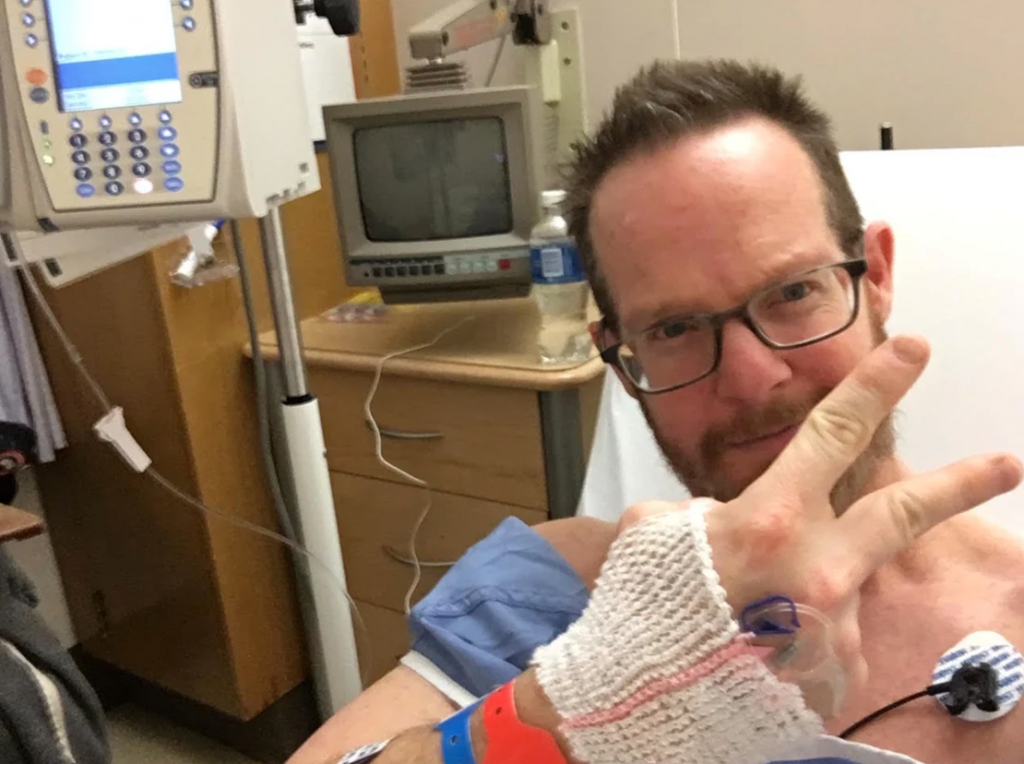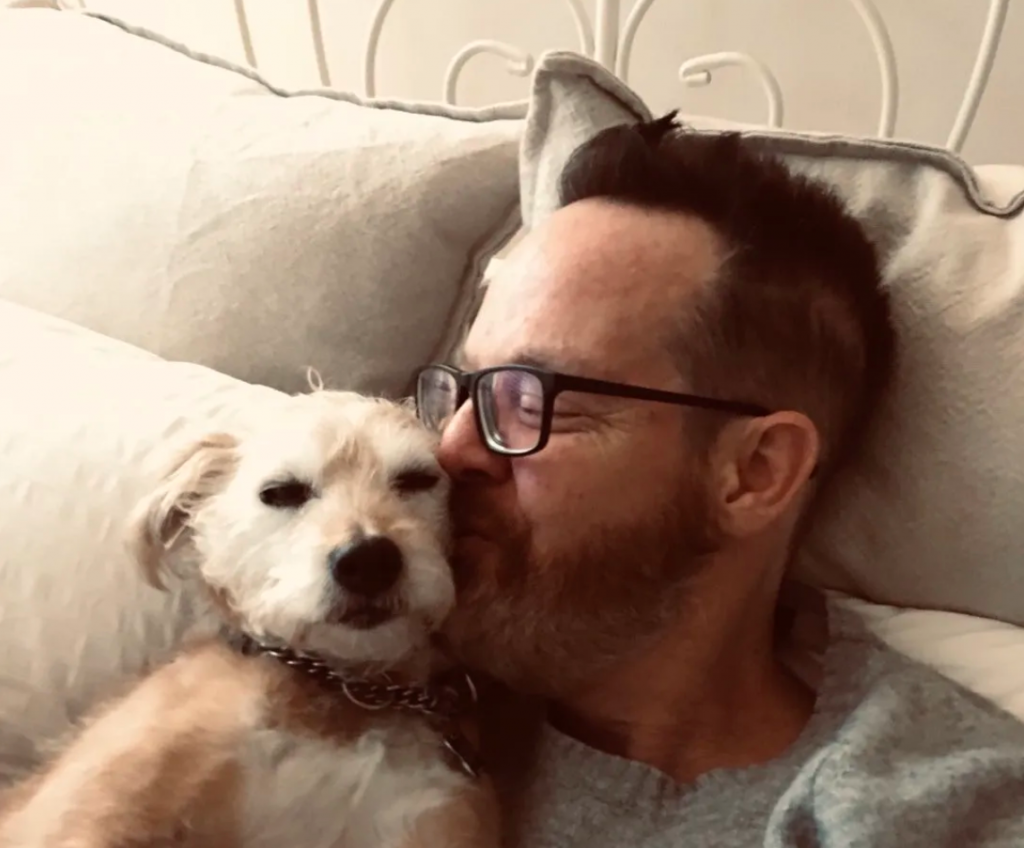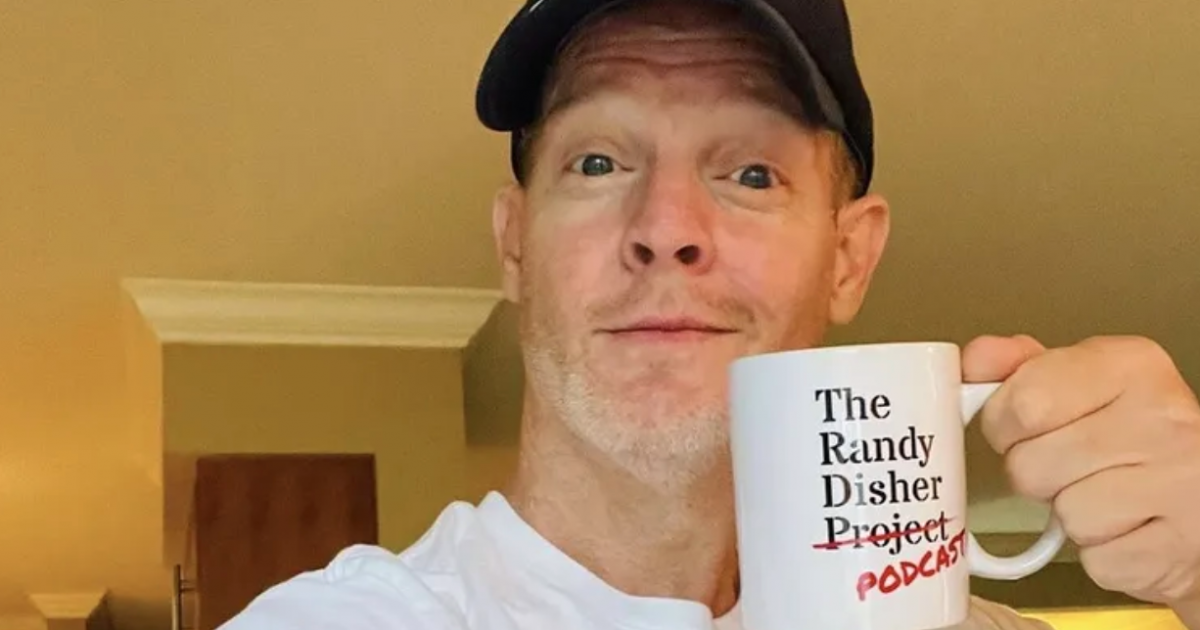A Fit, Healthy Man with Heart Failure
- Actor Jason Gray-Standford, 52, had a life-saving heart transplant in 2020 due to acute heart failure. Jason had been living with heart failure for over a year, then his condition took a near-fatal turn for the worse.
- Jason’s surgeon told him that he would have been dead in two weeks without this donor match and surgery; his heart was black when his doctor removed it, and Jason’s new heart began pumping immediately when he connected it.
- Classic heart failure symptoms may not always present and can vary from person to person, so it’s always best to keep track of anything out of the ordinary, like extreme fatigue or muscle soreness, as Jason describes.
Known to many beloved fans as Lt. Randy Disher on the hit show Monkwhich lasted eight seasons (2002-2009) and won a slew of Emmy Awardsthe generally healthy L.A.-based performer had no idea he would eventually be playing the role of heart failure advocate. Nevertheless, Jason welcomes his new calling, as he jokingly describes himself as an “amateur heart surgeon” after learning so much about his condition. Coincidentally, Jason just spoke with his cardiologist the morning of this interview, on the day of this important milestone, and once again reveled in the miraculous “near perfect” match that he received from a donor, whose family chooses to remain anonymous.
Read More“The surgeon said to my mom, when he called her to say, ‘Look, it went well, he’s doing okay.’ He basically said, you know, ‘Look, his heart was black when I took it out, he was probably gonna be dead in a couple of weeks,'” he recalled of his harrowing health status prior to the 2020 surgery, which happened to be at the height of the Covid-19 pandemic.“The one year marker [after surgery] is huge. If you can make it that first year with minimal issues, it’s really a game changer.”
View this post on Instagram
“‘And then when I put the new heart in,’ he said, when I put the new heart in and hooked it all up,’ as they do, he said it started to beat right away.”
Unfortunately, due to Covid protocols, as many of us are aware of, Jason couldn’t have his family with him in the hospital during his surgery, or upon wake-up to share his joy of experiencing his new beating heart. “And I was like, look, I’ve just gotta deal with this myself.”
A Highly Successful Heart Transplant
The Canadian-born TV star says that the surgery took a little over three hours; he was standing on his own within four.
“I was very lucky because that heart was such a good match that I had less complications in my recovery … it was fucking brutal. The recovery process, you know,” he admitted.
When it was showtime, Jason’s doctor asked him if he wanted to have the surgery done that night, or if Jason preferred that his surgeon get a night of sleep and do it in the morning. Jason chose the latter, which sounded more appealing.

Jason describes how they had to break his chest bone to get to his heart. “They cracked it open, did some work, and put it back together,” he said, the thought of it not phasing him too much. He was just happy to feel human again.
“When I woke up, even though I had stitches and tubes, I was like, man, I feel like I’m breathing,” he says of the life-changing moment. “I looked at my heart monitor. And for the first time, in like three years basically, I saw my heart beating in a normal rhythm.”
View this post on Instagram
Leading up to the surgery, Jason says that he had no feeling in his heart really, and couldn’t feel any anxiety. It was only working at about 20 percent.
“I was so, so lucky. I mean, I certainly had my share of side effects on the barrage of medicine they have to give you after, but I began to adjust to it,” he said. “And I, man, I certainly had dark days where it was not looking good. And I was like ‘one step forward, two steps back.’ But the thing that kept me going through it, number one, humor, positive attitude.”
“My family has a completely dark, black sense of humor, as black as my [old] heart,” he adds with a laugh.
Jason’s Initial Symptoms of Heart Issues
Jason first started noticing mild symptoms in 2018, which like too many people out there, he ignored at first.
“You know, in retrospect, I look back at it and I was in denial … I was like, ‘Okay, no way this is happening to somebody like me, super in tune with my body. I’m super fit. I eat right.’ And I didn’t want it to be happening. I completely ignored half the signs that were there.”
Related: Major Reduction in Cancer Risk by Following Old Standbys Diet and Exercise
It started with fatigue, and the avid gym-goer’s shoulders felt a little sore. “I literally was like, ‘Oh, I’m a little tired from working out at the gym. I’ll just get a little bit of rest. I’ll bounce right back. I’ll be fine,'” he had reassured himself.
Soon after, Jason started realizing this was not tired-from-work fatigue. It was a huge first symptom for him, which he wants others out there to look out for. “When we think of heart failure, heart disease, stroke, it’s like your arm tingles and your chest hurts. Right?” he explains of the “classic” symptoms we’ve all heard about.
Dr. Aeshita Dwivedi shares some common symptoms of heart failure.
“It was so not what I had,” he says, noting how everyone’s symptoms can be different. He felt like he had the flu, and still brushed it off completely. He had started waking up startled in the middle of the night and not knowing why, having a hard time breathing. When he had a couple of these episodes, he thankfully scheduled an appointment with a doctor, who did an EKG, an electrocardiogram, to check for heart conditions.
View this post on Instagram
“The guy came down literally 15 minutes later and he goes, dude, you need to go to the emergency room. Your heart is in this weird arrhythmia,” Jason recaps of the scary moment. “It’s bouncing all over the place.” (An arrhythmia is an irregular heartbeat that occurs when electrical signals that coordinate the heart’s beats aren’t working properly.)
Luckily, there was an ER across the street and he went right in, underwent multiple tests, and the cardiologist came down and said, “Look, we need to keep you here because you’ve got a lot of swelling on your heart. You’re fluid overloaded … and your heart is not pumping correctly.”
Jason’s official diagnosis was idiopathic dilated cardiomyopathy. He goes on to explain the condition, where the heart starts to enlarge and therefore loses its pumping power, which is called the ejection fraction. “And the more you lose that, it just doesn’t give blood to the rest of your body,” he says. “The idiopathic part means ‘we don’t know how you got it.'”
“The stigma is, that if you have some sort of heart failure, it’s on you. It’s your fault, right? And I was like, ‘wait, none of that was me'”
Ultimately, his medical team thinks he could have contracted a virus that wreaked havoc on his otherwise “normal” health. Since this was pre-Covid, with his symptoms starting in January of 2018, it’s impossible to tell if it was an early form of the virus or another type.
“And that was the beginning,” he adds. “Then I started taking a turn for the worse.”
Jason’s Life-or-Death Decision
At first, Jason’s condition was somewhat manageable. He spent the rest of 2018 into 2019 living a somewhat normal life. He was active. He was living an even healthier lifestyle. He was still working out. Then, all of a sudden, one day Jason was barely able to exercise.
“That’s when I started to get real sick, I mean, I couldn’t even do a push up,” he shares. “I just deteriorated that badly.”

Jason points out that his mother once survived a heart attack, but that was due to classic lifestyle issues, and clogged arteries, which Jason did not have, and he never suffered a heart attack throughout this entire ordeal. But then the classic symptoms started to seep in.
His other organs began turning on him. “My kidneys started to go south and when that starts to happen, a whole bunch of other things happen. So because the heart really runs the body, you know, it gives blood to all the other organs and gives oxygen … so my other organs started to fail.”
He was in and out of the hospital every couple months at this point. It was mentioned that he should consider getting on a heart transplant list for the future and begin getting the required testing.
“And I was like, ‘No way, not a chance,'” he had said. “‘I’m fine. I’m gonna be, I’m gonna be fine.'”
By then, Jason was used to managing it as a chronic disease, and truly thought he could go on living that way until some sort of “magic pill” was potentially developed down the road that could help him.
Then at the end of 2019, he was in a spin class, and woke up on the floor. “They put in a pacemaker. They put in a defibrillator too because they knew I was active,” he explains. “So, if I remained active in case my heart went into some weird arrhythmia that it would shock me in case I had a heart attack … then unfortunately none of that happened. The pacemaker didn’t really work because I was already too far gone.”
Doctors informed him that his medication he was on was no longer working. Nothing was working. His doctor then presented what would become life-saving news.
Dr. Aeshita Dwivedi explains how ARNIS, a drug to treat heart failure, work.
His doctor told him that they had a heart, and it was an “incredible” match for him.
Jason had a couple of hours to decide, and realized he would be “an idiot” if he didn’t do it. This miraculous opportunity would go to waste or would have to go to someone not as qualified as him.
“He’s like your alternative is dead or your alternative is so far gone [that] we can’t give you a heart transplant. And then you’re really fucked.”
Jason processed the grim reality, miraculous opportunity, and essentially said, “Let’s do this.”
Recovering from Surgery
Once he went through surgery and fortunately “came out on the other side,” Jason wanted to wait until he was more out of the woods to start sharing his story. After all, he wasn’t even sure yet what his “story” was, as he was still processing what he had been through. He had his mother and sister there with him along the way, but didn’t tell too many others.
Meeting other people who were going through similar things inspired him; Everyone has a story that you can learn from.
“In the heart transplant world, there’s a timeline … when you get out of your heart transplant, you are far from in the clear,” he says. “Now you’re susceptible to infection, rejection, all these things. So I honestly didn’t wanna to speak too soon and be like, ‘Hey everybody, I’m recovering and doing well.’ And then three months later …”
View this post on Instagram
Jason was in the hospital every week or two for about six months, getting biopsies done, “which is basically taking pieces of your heart and testing them every week,” he says. “You’re going in for angiograms to make sure that your arteries are clean. You’re basically getting used to all the medication that you have to take.”
“It’s a life-changing experience, you know, and you kind of have to realize you gotta get a handle on it yourself before you can talk to anybody else about it.”
Plus, the “fickle” entertainment business that he is a part of, well, at times people can immediately come to negative conclusions about someone’s health and assume they know how or why they came into that predicament. Of course, he wanted to get back to work, and “tainted goods was one of my biggest fears,” he says, which many cancer survivors and other chronic disease patients unfortunately know quite a bit about.
View this post on Instagram
In time, he gained confidence to share his story, and is now just happy for the gift of life, and his donor and their family of course.
“I’m so grateful for them. The only thing I know about my donor is that it was a very young and healthy heart that had a lot of details about it,” he shares, “they knew a lot of things about the heart. Like they knew some prior diseases it might have had or not had, you know, so they, they had a good book on it, which is why they knew it was such a good match for me.”
Jason has teamed up with the American Heart Association, and has made appearances on programs like The Kelly Clarkson Show. After regretting being too picky on parts following the grand success of Monk, he is back to acting and auditioning, and not taking himself so seriously. Jason even teases that he “can’t give away any details,” but diehard Monk fans may be in for a treat for some very exciting news coming …
“This was a long road back, but I am back, you know what I mean?”
Learn more about SurvivorNet's rigorous medical review process.


